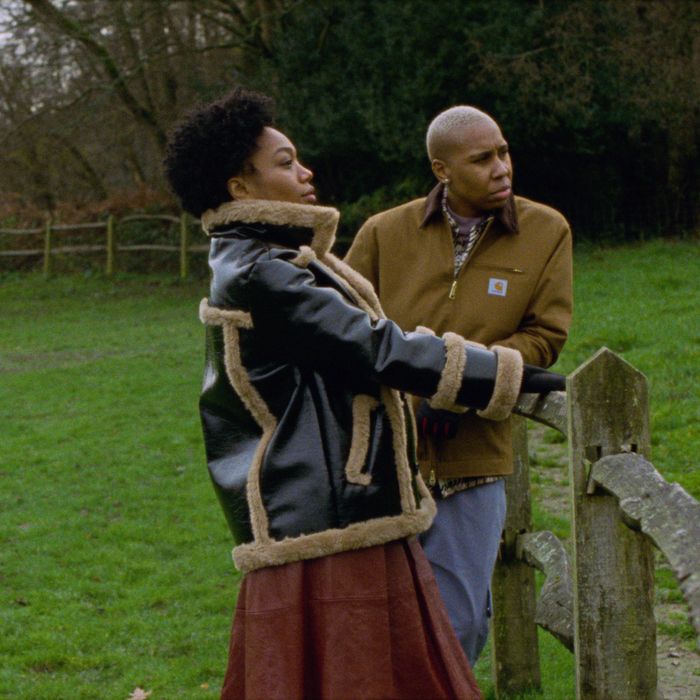
Master of None
The finale of Master of None’s “Moments in Love” is an interesting thing to consider because it’s both a completely fitting ending and a total cop-out. It’s almost impossible to critique because it doesn’t go full tilt in the direction of any particular decision. Instead, it leaves our protagonists Denise (Lena Waithe) and Alicia (Naomi Ackie) suspended in an in-between place that reflects the state of their current relationship to each other. You can’t judge their choices, because neither of them has made a real decision.
A few years after Alicia’s quest to get pregnant, she and Denise meet up for a weekend getaway, Airbnbing at their old house in upstate New York. In the time since we’ve last seen them, both have remarried — Alicia now has a daughter named Lola and Denise has a son named Justin. They’re both restless in their new relationships and have made a habit of escaping together for a weekend at a time. Neither of their spouses knows the truth of where they are, or that they’ve reconciled. But they’ve managed to commit to seeing each other on what is implied to be a fairly regular basis.
Each of their lives has changed significantly since their one-time marriage. Now, their roles are reversed. Denise is working a cubicle job she hates, afraid to put herself out there again after her second book was a commercial failure. But Alicia has finally gotten her hands on that commercial space, and her interior design business is thriving. But importantly, their new perspectives have given them insight into each other that they never had when they were married.
Alicia tells Denise that she resented her while they were married. She had the success that Alicia coveted, and she was jealous that she wasn’t able to make her own dreams happen. Now that she’s on the other side of it, she understands how the pressure to continue succeeding can be all-consuming. Denise, on the other hand, is dealing with the failure she’d always feared would find her, and figuring out how to dig her way back out of the pit of negative critique she’s taken to heart.
Later that evening, they dance, trade war stories about their children, and finally have an even-handed reconciliation with what happened in their marriage.When Alicia asks if she should have fought for their marriage, Denise assures her that she did what was right for her at the time. Relationships are messy, and they don’t always work. When they were married, they didn’t have space to accommodate each other in their lives. Now that they’re apart, they’ve fulfilled the needs they weren’t able to get from each other and can finally make space for the things they loved about each other in the first place.
The catch, of course, is that they’re having an affair. And curiously, Waithe doesn’t come down on either side of that decision in the writing. Denise and Alicia know that they’re betraying their wives, but they’ve also agreed not to acknowledge it while they’re together. “We cannot talk about ‘the thing’ or else ‘the thing’ will make us spiral. No spiraling.” Brief as it is, it’s a tacit admission that the compromise they’ve found with each other compromises their current relationships, too.
Importantly though, we never meet these new wives. We learn their names, but they’re spoken about in quasi-hushed tones, a rudeness they’d rather not acknowledge. Denise and Alicia opt to remain in the artificial bubble they’ve created for themselves in their old home, figuratively returning to the time when they were supposed to be happy but weren’t. Now, they get a do-over. They’re free to erase the painful memories they left behind and create new ones untainted by the bounds of their original dysfunction.
It’s a choice few would defend, but it makes a kind of emotional sense. Years removed from the conflict that tore them apart, they can recognize that they needed to be whole, independent people before coming together. What makes it confusing is why this revelation needs to be accompanied by deceit. Polyamorous relationships aren’t for everyone, and they require work, honesty, and commitment. But they are an option that would allow Alicia and Denise to have their cake and eat it too. It feels almost pointed that Waithe would leave her characters in this liminal space, rather than taking the extra step of giving them a complete if non-traditional kind of happiness.
But the women are more than aware of the limits on their love for each other. Alicia says she thought of Denise often as she raised her daughter alone, and Denise admits that she’d never have been ready to have children of her own without the experiences they had together. Breaking up was what made them ready to come back together. But even in the chamber piece that is their relationship, they can’t quite get the whole of each other. Even if that never happens for them, maybe it’s enough that they have this brief respite.
"love" - Google News
May 29, 2021 at 10:20AM
https://ift.tt/3wBzVLe
Master of None Season-Finale Recap: Reconcile and Rekindle - Vulture
"love" - Google News
https://ift.tt/39HfQIT
Shoes Man Tutorial
Pos News Update
Meme Update
Korean Entertainment News
Japan News Update
Bagikan Berita Ini














0 Response to "Master of None Season-Finale Recap: Reconcile and Rekindle - Vulture"
Post a Comment